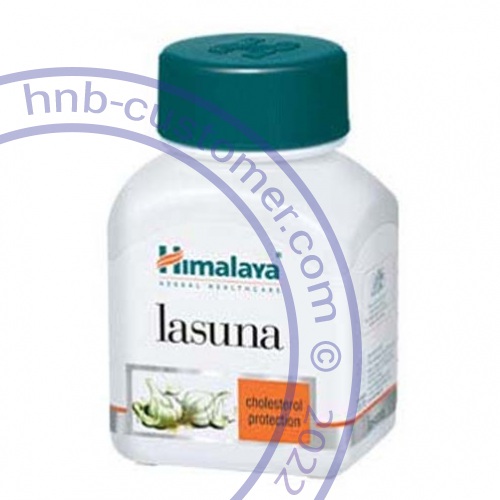Lasuna
Lasuna
Lasuna bottle
What is this herbal medicine?
LASUNA (Garlic/Allium sativum) is well-known as a pungent, culinary spice in several cultures; the herb is one of the most researched plants for its medicinal benefits. Hippocrates, the father of medicine, had mentioned Lasuna in his medical notes and recommended its use in treating infections. Lasuna was known to Chinese health providers before 3,000 BC and is a vital part of the Chinese diet and medicine even today. It also features strongly in Egyptian, Greek, Roman and African diets and is used as a medicine for several common ailments. Researchers at the Hartford Hospital, Connecticut, conducted a meta-analysis study of ten recent clinical trials and found Lasuna to be supportive of normal blood pressure levels in the body (The Annals of Pharmacotherapy, December 2008, 42(12):1766-71). Scientists at the Department of Medicinal Chemistry, Hebrew University-Hassadah Medical School, Jerusalem, recently studied Lasuna for its antioxidant activity and support of normal cardiovascular function. They found the herb to be supportive of normal plasma lipid levels and noted its various ‘positive influences’ (Molecular Nutrition and Food Research, November 2007, 51(11):1365-81). Easy to cultivate, Lasuna is grown globally. China is the world’s largest producer of the herb, followed by India, South Korea and the United States.
Active constituents
The most important chemical constituents found in the garlic bulb are the sulphur compounds, predominantly alliin. When the garlic bulb is crushed, minced, or otherwise processed, alliin is released and interacts with the enzyme alliinase. Hydrolysis and immediate condensation of the reactive intermediate allylsulfenic acid forms allicin. One milligram of alliin is considered to be equivalent to 0.45 mg of allicin. Allicin itself is an unstable product and will undergo additional reactions to form other derivatives depending on environmental and processing conditions. These compounds work together to lower blood pressure, tone up cardiac muscles and combat dyspepsia.
Herb functions:
- Antihyperlipidemic: Lasuna lowers cholesterol, plasma lipids, cholesterol biosynthesis and atherogenesis (the accumulation of lipid-containing plaque on the innermost layer of the artery wall). Allicin lowers serum and total lipids levels in the liver, phospholipids, triglycerides and total cholesterol.
- Antihypertensive: Lasuna helps in vasodilation. Vasodilation relaxes the blood vessels so that blood moves easily through them, and, subsequently, the pressure exerted by the blood on the artery walls is reduced. By closing the calcium channels, the cardiac output is decreased due to the less frequent contractions of the cardiac muscle. This action is helpful in reducing blood pressure.
- Antithrombotic: Lasuna increases serum fibrinolytic activity and inhibits platelet aggregation. Adenosine, alliin, allicin and the transformation products of allicin (the ajoenes, vinyldithiins, and dialkyloligosulfides), are responsible for the inhibition of platelet adhesion and aggregation. These properties of Lasuna make it an excellent choice in conditions like coronary atherosclerosis, ischemic heart disease, peripheral vascular disease and other vascular diseases.
- Expectorant: Lasuna has been traditionally used in respiratory conditions like asthma and bronchitis. The herb contains sulphur compounds, which contribute towards its mucolytic and expectorant properties.
- Digestive: The Lasuna bulb is effective in treating dyspepsia as it stimulates peristaltic action and the secretion of digestive juices. It also relieves flatulence.
Indications:
- Susceptibility for increased levels of cholesterol in the blood (for those with positive family history, sedentary work habits and lifestyle)
- Dyspepsia
- Flatulence
Contraindications:
None
Recommended dose:
One capsule, twice a day or as directed by your physician
Composition
Each capsule contains 250mg extract of Lasuna
Note: The information on this page is not intended to be a substitute for professional medical advice. Do not use this information to diagnose or treat your problem without consulting your doctor.













